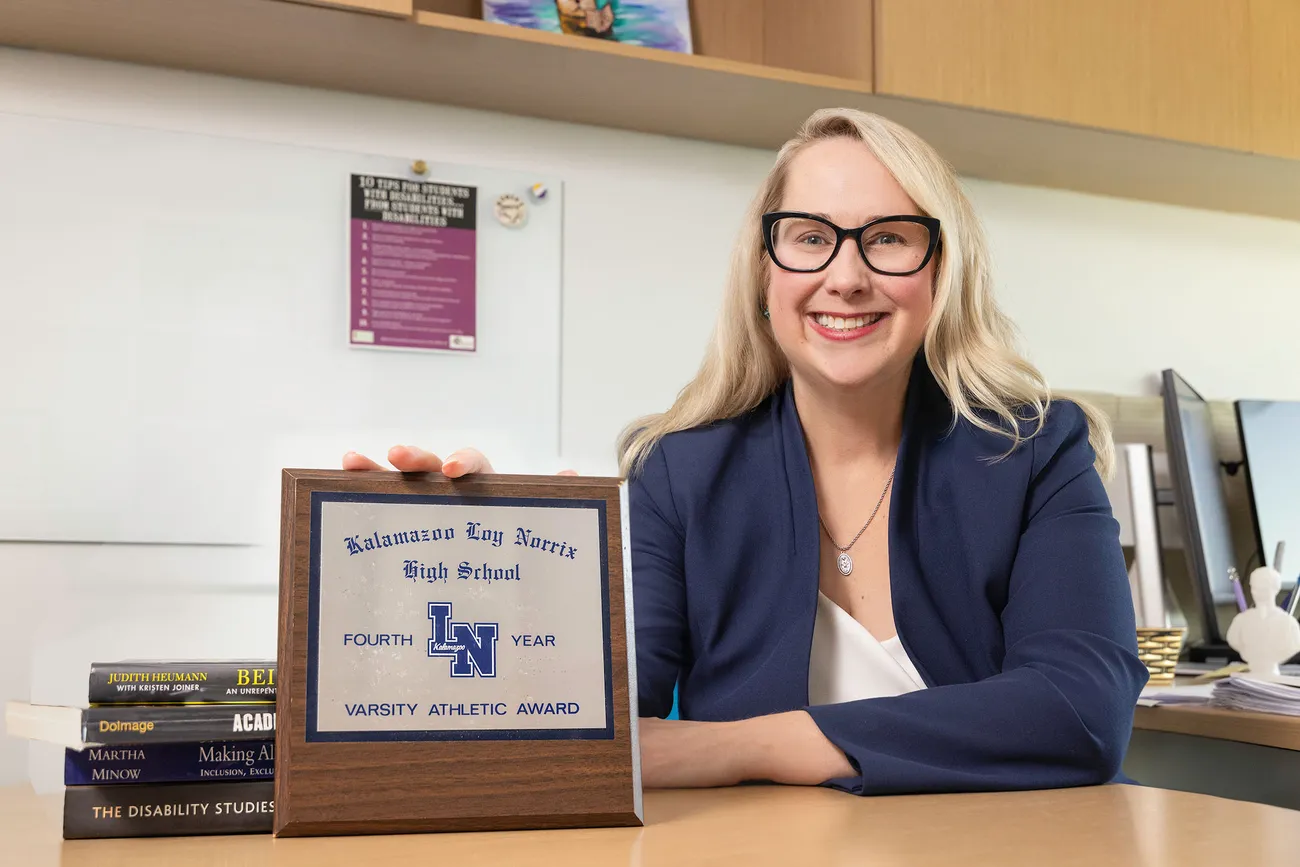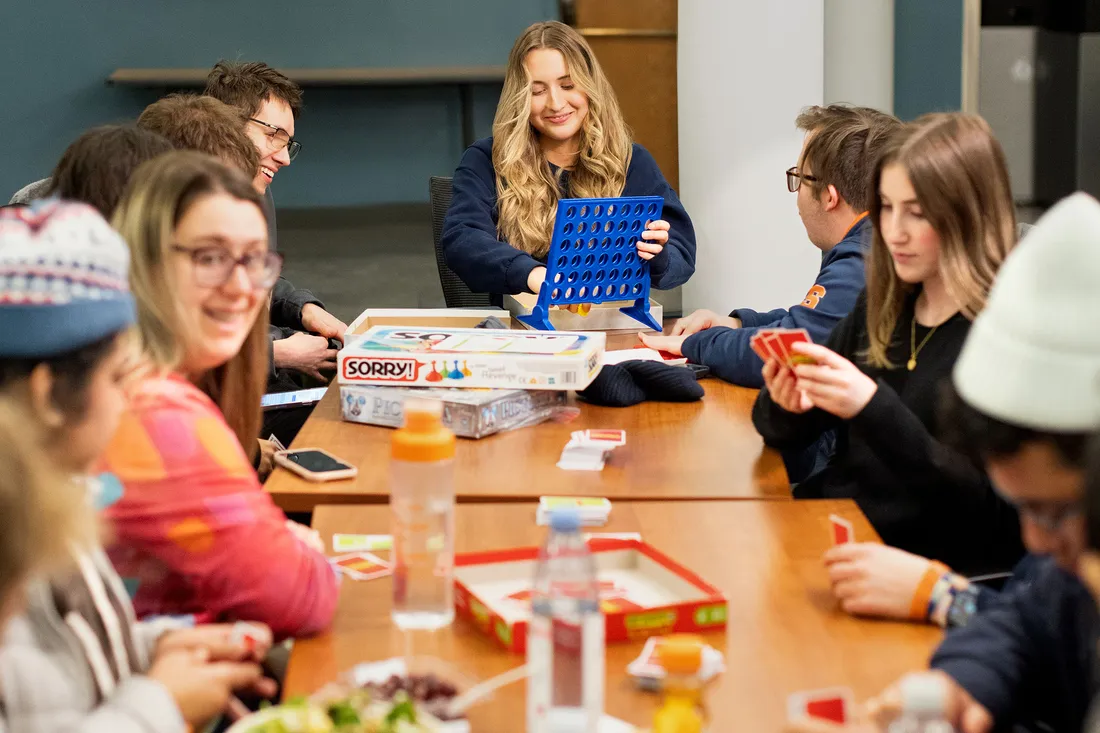In high school, Katherine “Kat” Macfarlane was captain of the swim team. First in her class. Voted “most likely to succeed.” She graduated college magna cum laude, passed the bar in both California and New York and is fluent in three languages. At first glance, the College of Law professor might seem like the quintessential high achiever straight out of a teen movie, but her journey has been anything but typical.
Macfarlane was just 13 months old when she was diagnosed with rheumatoid arthritis (RA), a degenerative autoimmune disease that causes joint swelling, stiffness and mobility impairment, among other symptoms. Growing up, she faced not only the physical challenges of her condition but also the complexities of securing accommodations while trying to fit in with her peers.
Today, as Syracuse University’s director of the Disability Law and Policy Program (DLPP), Macfarlane is shaping the next generation of disability law scholars and fostering a more inclusive environment for students and academics with disabilities.
A Childhood Defined by Resilience
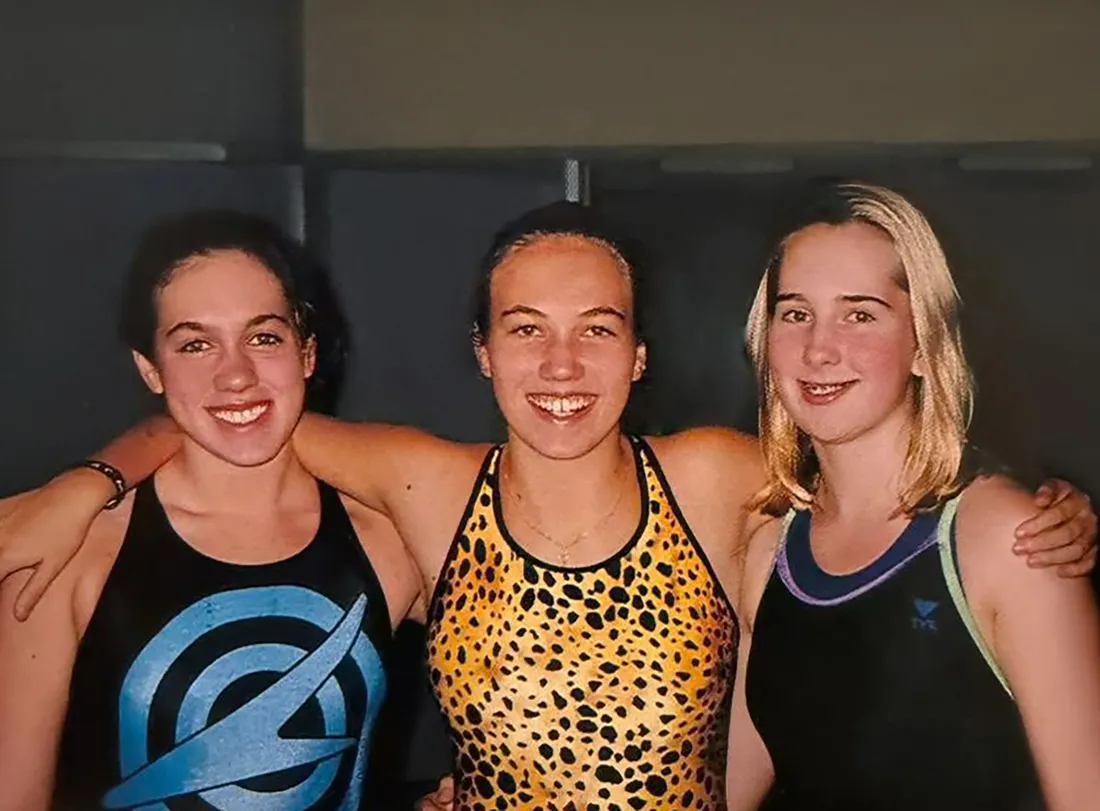
A young Kat Macfarlane (right) with her swim teammates in Kalamazoo, Michigan.
“Throughout my childhood, I was constantly, and still am, going to doctor’s appointments and dealing with surgeries and procedures,” Macfarlane says.
She spent part of her early childhood in Italy, where her father worked for the United Nations. While she thrived academically, learning alongside children from all over the world, she struggled in private. She kept her RA and related medical matters to herself. “I was both afraid of being treated differently and ashamed of how different I was,” Macfarlane recalls.
Her elementary school teachers were unsure how to accommodate her. “In Italy, I literally sat on the sidelines during every gym class. I just didn’t participate. It was very isolating and embarrassing,” she says.

Despite the challenges of having rheumatoid arthritis, Macfarlane thrived in high school. Voted “most likely to succeed,” she graduated at the top of her class and served as team captain, class secretary and president of the Spanish club.
When she moved to the U.S. in middle school, Macfarlane was fortunate to find a supportive community. Her teachers and coaches recognized her potential and helped her embrace her inner athlete, build social confidence and find her voice as a leader. Macfarlane served as student council president, captained the volleyball and basketball teams and raced the grueling 500-yard freestyle.
“My swimming coach had the emotional intelligence to see that I was accustomed to resilience and perseverance,” she says. “A longer race, which required mental tenacity but relied less on my ability to kick, made more sense. He was a great coach and teacher. I was very lucky.”
A Journey Across States and Systems
As she pursued educational and career opportunities, Macfarlane bounced around the country, living in six different states. “When you have a chronic illness, you have to reestablish care everywhere,” Macfarlane explains. “But I’m going where the opportunity leads.”
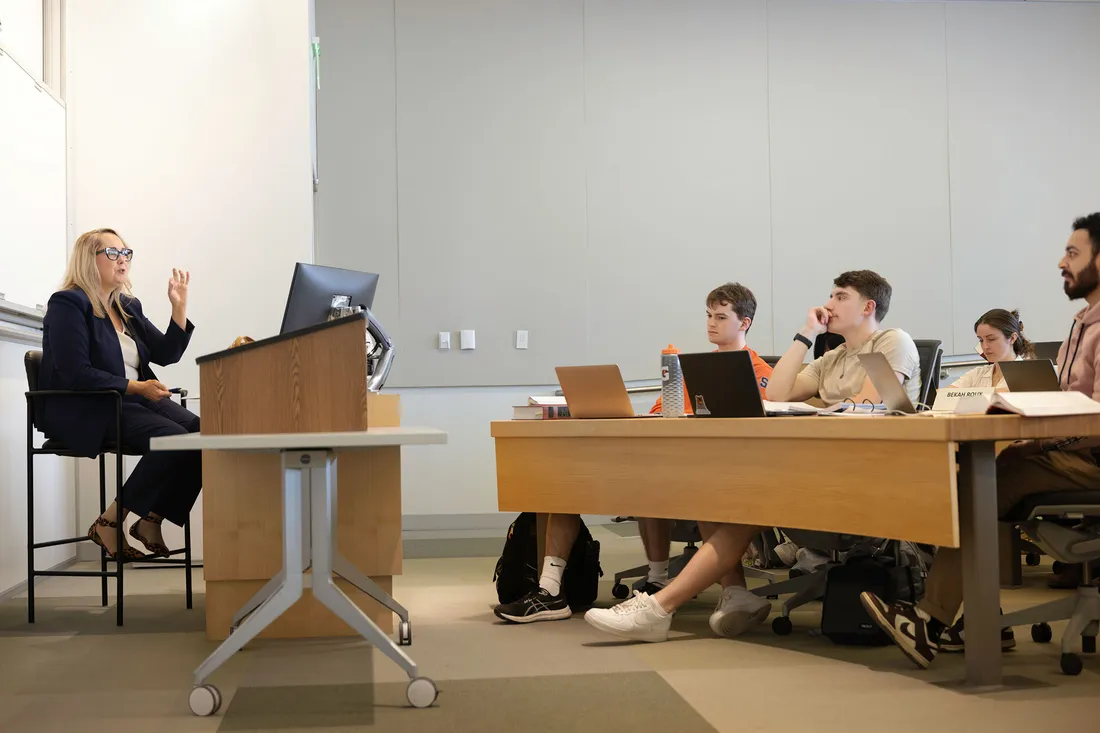
Macfarlane teaches constitutional law at Syracuse University’s College of Law. As a leading voice in the field, Macfarlane has testified before the Louisiana State Legislature and participated in a Congressional Arthritis Caucus briefing in Washington, D.C.
With every new role, Macfarlane had to fight for disability accommodations. Invisible disabilities, like RA, often require a complicated paperwork-heavy process involving medical documentation and meetings. “Sitting down with someone during your first few weeks of school and describing some of the hardest aspects of your life is maybe the last thing you want to do,” she explains. “Securing accommodations should be an experience driven by the needs of people with disabilities, as they see them, not a difficult bureaucratic one,” says Macfarlane, who has advocated for streamlining the process.
It wasn’t until she started teaching that Macfarlane began to open up about her RA diagnosis with colleagues and students. “My students have always inspired me and had my back,” she says. “I realized that there was something powerful about being open about my own disabilities and that it would maybe give them reason to do the same.”
As Macfarlane deepened her academic engagement with disability rights and law—through research, writing, teaching and even testifying before legislature—she emerged as a leading expert in the field.
Empowering Future Leaders

Macfarlane (center) meets with law students Lela Lanier (left) and Emely Recinos (right).
In the summer of 2023, Macfarlane joined Syracuse University’s College of Law as an associate professor and the director of the DLPP.
“It’s been freeing to use my lived experience in my work,” Macfarlane says. “At the college, we attract students with disabilities, and for the first time in my life, I’m in a community where there are other disabled people.”
In addition to teaching civil rights litigation, constitutional law and disability law, Macfarlane has worked to bring guest scholars with disabilities to campus to share their lived experiences. She has created a disability law-focused student scholarship symposium where students present research and connect on a range of disability topics. Macfarlane is also working on a mentorship program to guide students and showcase possibilities within disability law, civil rights and constitutional law, both in academia and in practice.
“You absolutely belong,” Macfarlane tells prospective lawyers with disabilities. “We need people with disabilities working in corporate law and Big Law, not just in disability or civil rights fields. We need people with disabilities on the Supreme Court.”
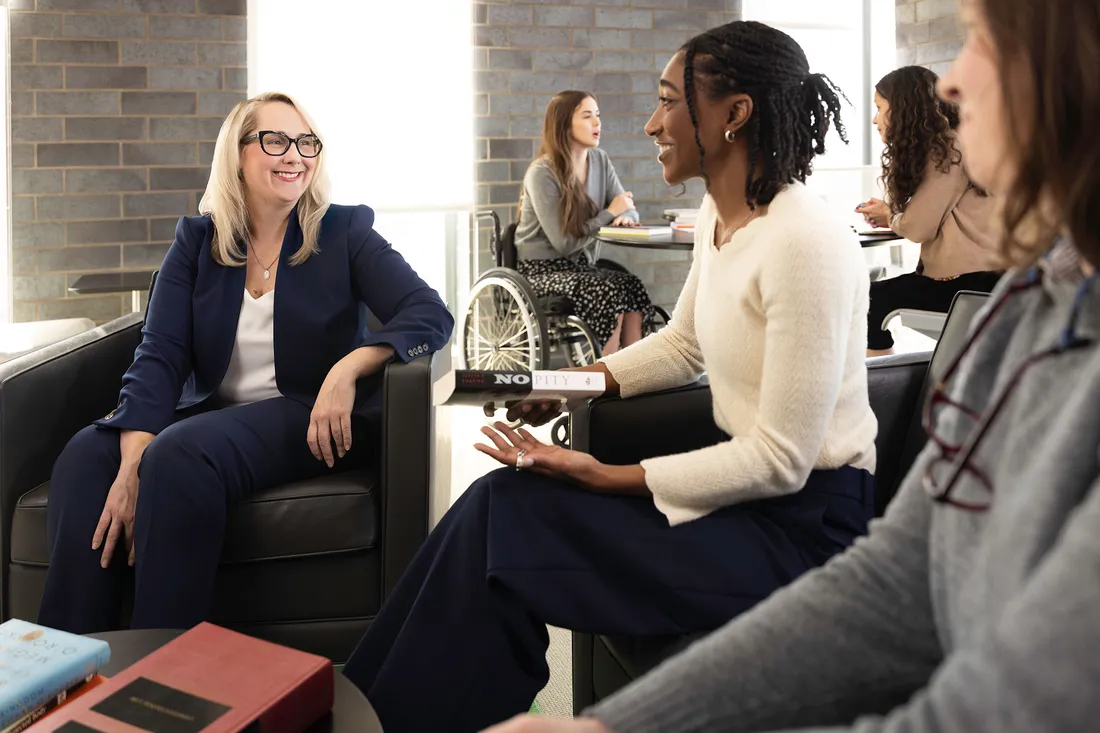
As the director of the Disability Law and Policy Program (DLPP), Macfarlane mentors students with disabilities and those pursuing careers in disability law.
Paying It Forward
Now an advisor and advocate for others, Macfarlane is deeply grateful for those who have helped her along the way.
“I get emotional thinking about it because my life could have been so different,” Macfarlane says. “My mother made the choice to put me in swimming, and I received aggressive medical care from a young age. Then, I had coaches who weren’t scared off and saw the hidden athlete in me. Playing sports opened a joyful aspect of my life that led to community and friendships.”
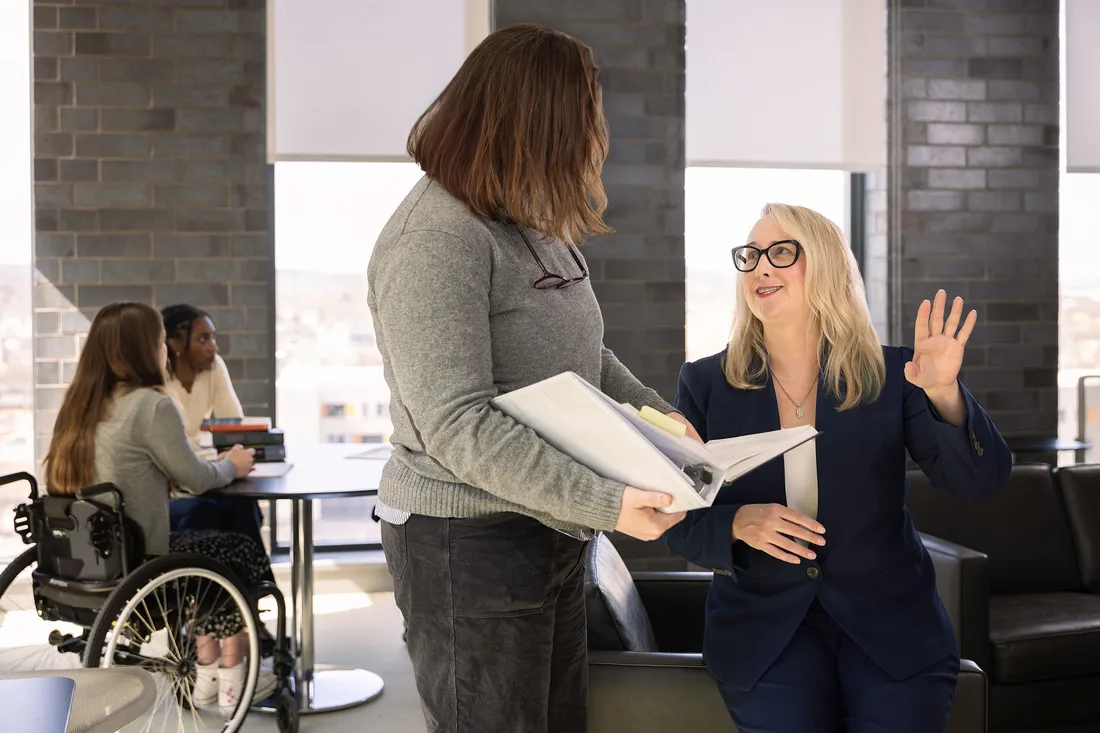
Macfarlane collaborates with DLPP faculty assistant Anna Dallam (left). Macfarlane’s advocacy earned her the Chai Feldblum Award from the Association of American Law Schools’ Section on Law Professors with Disabilities and Allies.
Macfarlane’s journey is a testament to the power of resilience, the importance of allyship and the transformative impact of advocacy. Through her work at Syracuse University, she is creating a community where students are empowered to find their voice, break barriers and achieve their dreams.
To all, her message is simple but powerful: “Meet the person where they are. Don’t put them on the sidelines. Find a way for them to participate and, if it suits them, to excel.”

